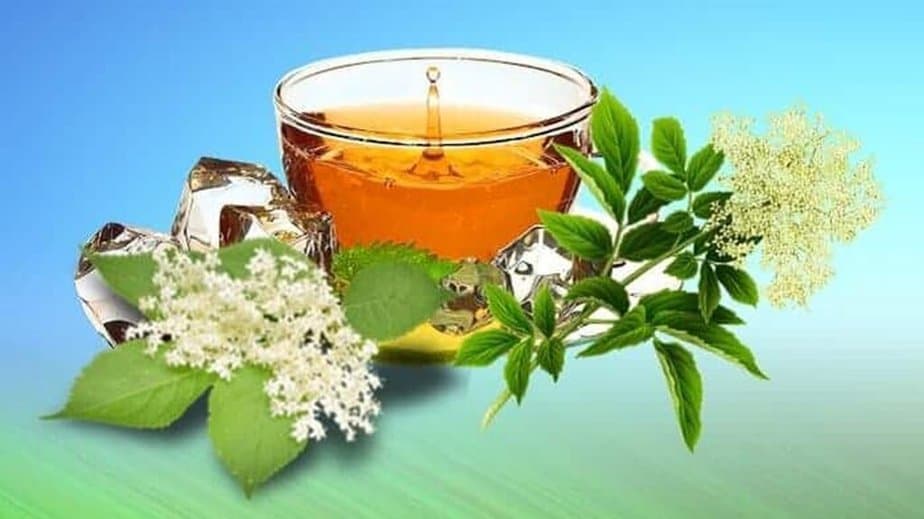Evidence from history suggests that in the past 4000 years, natural healers have effectively used elderflower for treating allergies, asthma, the common cold, and flu. Almost every book on traditional medicines from ancient times refers to the elder as “the medicine chest of the country folk”.
This article digs into elderflower benefits, right uses, and possible side effects.
Bioactive Properties In Elderflower
One of the studies published by the Journal of Functional Foods has revealed the chemical and bioactive compounds in elderflowers and elderberries. Bioflavonoids like quercetin, isoquercitrin, and anthocyanins are amply present in this flower and they are potential antioxidant, antiviral, and anti-inflammatory compounds highly beneficial for the human body. Similarly, the chlorogenic acids found in elder tree flowers and berries have immense health benefits.
Other useful compounds like Triterpenoids, especially β-amyrin, erythritol, and oleanolic acid, are also found in elderflower. These compounds and acids in elderflower can enhance the production of insulin and digestive enzymes. They also provide the need anti-inflammatory, analgesic, anti-cancer, antibacterial, diuretic, and laxative properties to our body.
Elderflower Benefits: Based On 5 Traditional Uses
Elderflower and elderberries have several uses and benefits in the preparation of medicines, foods, nutrition, winemaking, and fodder. We can classify those benefits under five categories:
1. Nutritional Benefits
Elderflower is comprised of several essential vitamins, minerals, and bioactive compounds. This flower contains a significant amount of Vitamin C, the most important vitamin for strong immunity. Also, Vitamins A, the B-1, B-2, and B-3 complex are available in this flower though in insignificant amounts. The most important nutritional benefit is the handsome amount of important bioflavonoids and chlorogenic acids that this flower can supply to our bodies.
2. Health Benefits
Elderflower is highly valued for its manifold health benefits. The flowers and berries of the elder tree are rich in antioxidants, and compounds that exhibit antiviral, antibacterial, anti-inflammatory, laxative, and diuretic qualities and functions. Such a wide array of diverse health benefits are rarely found in single-plant products like flowers or berries.
3. Folk Medicines
Elderflower extract is popularly used in several traditional herbal medicines for treating common ailments. From the pre-historic periods, people have heavily relied on the antiseptic, astringent, anti-inflammatory, and antimicrobial properties of this flower.
Unverified medicinal benefits of elderflower include:
- Common cold.
- Constipation.
- Cough.
- Diabetes.
- Flu (influenza).
- Bronchitis.
- Rhinosinusitis.
- Rhinosinusitis.
- Minor bleeding.
- Rheumatoid arthritis.
- Sore eyes.
- Mouthwash/oral rinse.
4. Uses In Cooking
Another very important benefits of the elderflower are its several uses in food preparations. Syrups and cordials prepared with this flower are popular flavoring ingredients used in desserts, baked goods, jams, jellies, candies, and cocktail drinks. Cooked flowers are used in seasonal dishes and as a garnish. Elderflower tea is a popular health drink in several regions, besides, this tea is a good substitute for regular black or green tea.
5. Uses In Liqueur Making
Elderflower is a widely used ingredient in liqueur manufacturing. In fact, some of the most sort-after varieties of liqueurs in the world are elderflower gin, champagne, and cocktails. Elderflower cordials and syrups are popularly used for flavoring cocktails and liqueur-based beverages.
Elderflower Side Effects
There isn’t enough verified evidence sighting the adverse effects of elderflower. It’s likely safe when used in foods and beverages. Similarly, elderflower in small quantities used in medicinal preparations is unlikely to cause any side effects.
Warning: Consuming a large quantity of elderflower may upset the digestive system and cause vomiting, dysentery, or headache for some. When this flower is used in combination with other herbs can result in mild stomach upset, allergic reaction, or physical uneasiness. Pregnant women, minor children, and diabetic patients should not consume elderflower without the consent of a medical doctor.
Elderflower Dosage
According to a few unverified clinical trial reports, 40 mg of elderflower extract is sufficient enough per dose for effective results. For example, for treating sinus, flue, or severe cold, a combination of 36 mg of elderflower plus 12 mg of gentian root, and 36 mg each of sorrel, verbena, and cowslip flower is used per dose; administer up to 3 such doses per day.
Like most other herbal extracts, consuming more than 200 mg of elderflower extract per day is not recommended.
Final Thoughts
Men in the pre-historic period identified elderflower benefits for health and its medicinal qualities. Today, elderflower tea, syrups, and cordials are widely used not only for their health benefits but also for their wonderful flavor. This flower is endowed with several compounds that work as antioxidants, antimicrobial, anti-inflammatory, laxative, and diuretic elements for good health.
Related Articles:
- How does witch hazel help hemorrhoids?
- What essential oils to use for bronchitis?
- Get relief from the sinus with these essential oils.
- Here are the essential oils that help arthritis.
